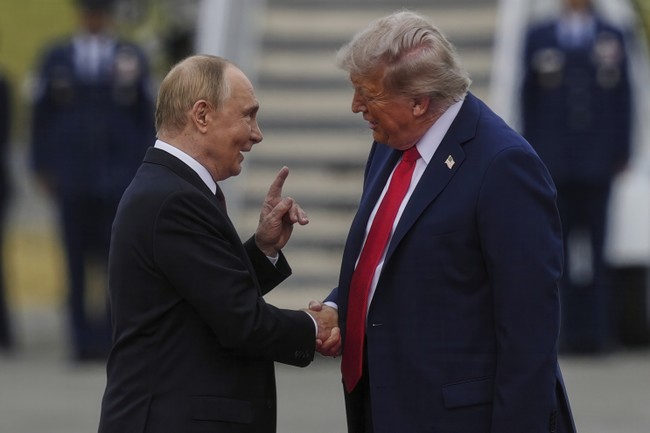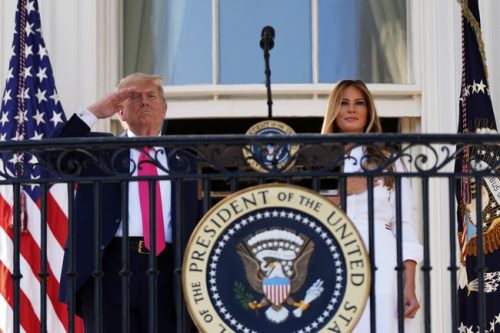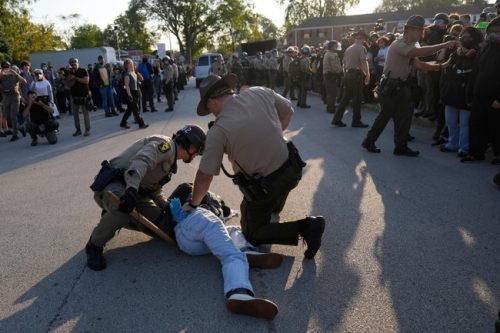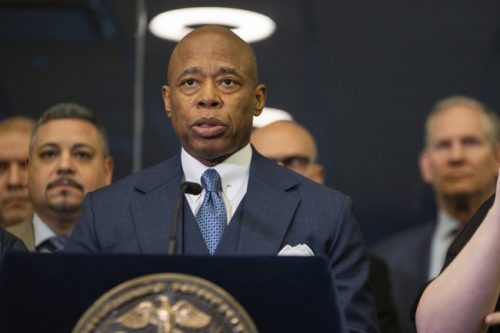President Trump has slapped new, tough sanctions on Russia’s biggest oil firms aiming to squeeze Vladimir Putin’s war chest and force Moscow back to the negotiating table. The move shifts pressure from diplomatic talk to hard economic measures, drawing praise from Republican leaders and immediate debate about enforcement and allied cooperation.
The Treasury rolled out the policy in a formal announcement, framing the action as a response to “Russia’s lack of serious commitment to a peace process to end the war in Ukraine.” That phrase captures the administration’s claim that sanctions are intended to change incentives, not just punish. Officials say the goal is to push Russia toward bargaining for a ceasefire by choking off revenues tied to the energy sector.
“Today’s actions increase pressure on Russia’s energy sector and degrade the Kremlin’s ability to raise revenue for its war machine and support its weakened economy. The United States will continue to advocate for a peaceful resolution to the war, and a permanent peace depends entirely on Russia’s willingness to negotiate in good faith. Treasury will continue to use its authorities in support of a peace process.”
““Now is the time to stop the killing and for an immediate ceasefire,” said Secretary of the Treasury Scott Bessent. “Given President Putin’s refusal to end this senseless war, Treasury is sanctioning Russia’s two largest oil companies that fund the Kremlin’s war machine. Treasury is prepared to take further action if necessary to support President Trump’s effort to end yet another war. We encourage our allies to join us in and adhere to these sanctions.””
“Today’s action targets Russia’s two largest oil companies, Open Joint Stock Company Rosneft Oil Company (Rosneft) and Lukoil OAO (Lukoil), which are now designated. Rosneft is a vertically integrated energy company specializing in the exploration, extraction, production, refining, transport, and sale of petroleum, natural gas, and petroleum products. Lukoil engages in the exploration, production, refining, marketing, and distribution of oil and gas in Russia and internationally.”
House Speaker Mike Johnson (R-LA) lauded the move, calling it “a very important step” and praising Trump for “returning to peace through strength.” Many in the GOP see the sanctions as a clear test of whether economic pressure can deliver results where diplomacy has so far stalled.
Last week the president wrote that he had a “very productive” phone call with Putin and had at one point eyed a meeting in Budapest in November. The planned summit was later canceled, and the White House said the timing and progress simply didn’t add up to a deal on the table. Mr. Trump voiced frustration that conversations with Putin repeatedly fail to yield concrete outcomes.
Russia has proven over and over they cannot be trusted and the sanctions announced by the Trump Administration are a VERY important step.
We applaud President Trump's peace through STRENGTH approach to compel Russia to engage in the peace process.
President Trump is the only… pic.twitter.com/MV9eb7rx6r
— Speaker Mike Johnson (@SpeakerJohnson) October 23, 2025
He explained his decision to scupper the Budapest summit that had been planned for some time in the coming weeks. “It just it didn’t feel right to me,” Mr. Trump said. “It didn’t feel like we were going to get to the place we have to get. So I canceled it.”
As for the sanctions?
“I just felt it was the right time,” he said.
Administration officials and outside analysts agree these steps are among the most consequential U.S. actions against the Russian energy sector since the invasion of Ukraine. Previous administrations held back from targeting major Russian oil companies directly, arguing that allies needed legal pathways to keep energy flowing. That restraint limited pressure on Moscow’s revenues, which the new measures are now squarely aimed at cutting.
Enforcement will determine whether the sanctions bite hard or simply complicate trade routes. “These sanctions are a big step, but they’ve got to either use, or actively threaten to use, secondary sanctions here on third countries,” said Daniel Tannebaum, a partner in the consulting firm Oliver Wyman’s risk and public policy practice and an Atlantic Council fellow. His point underlines a familiar reality: unilateral steps matter less without allied coordination or the credible threat of broader penalties.
Republican supporters frame the move as a return to policy that pairs diplomacy with leverage, not naïve optimism. They argue that applying economic pain to the entities that fund Moscow’s military effort is a practical way to press for a ceasefire and to protect U.S. strategic interests. Critics, however, warn that the true impact will depend on how rigorously Washington and partners police evasion and rerouting of funds.
The sanctions target companies central to Russia’s oil industry and signal the administration’s readiness to escalate if Moscow resists talks. Whether that escalation brings Putin to genuine negotiations or merely reshapes the global energy trade will be the measure of its success in the weeks and months to come.






